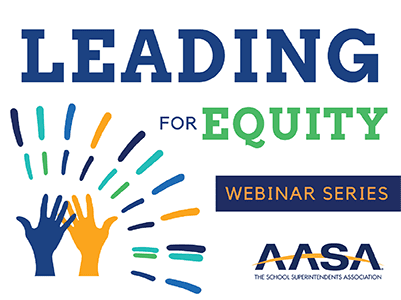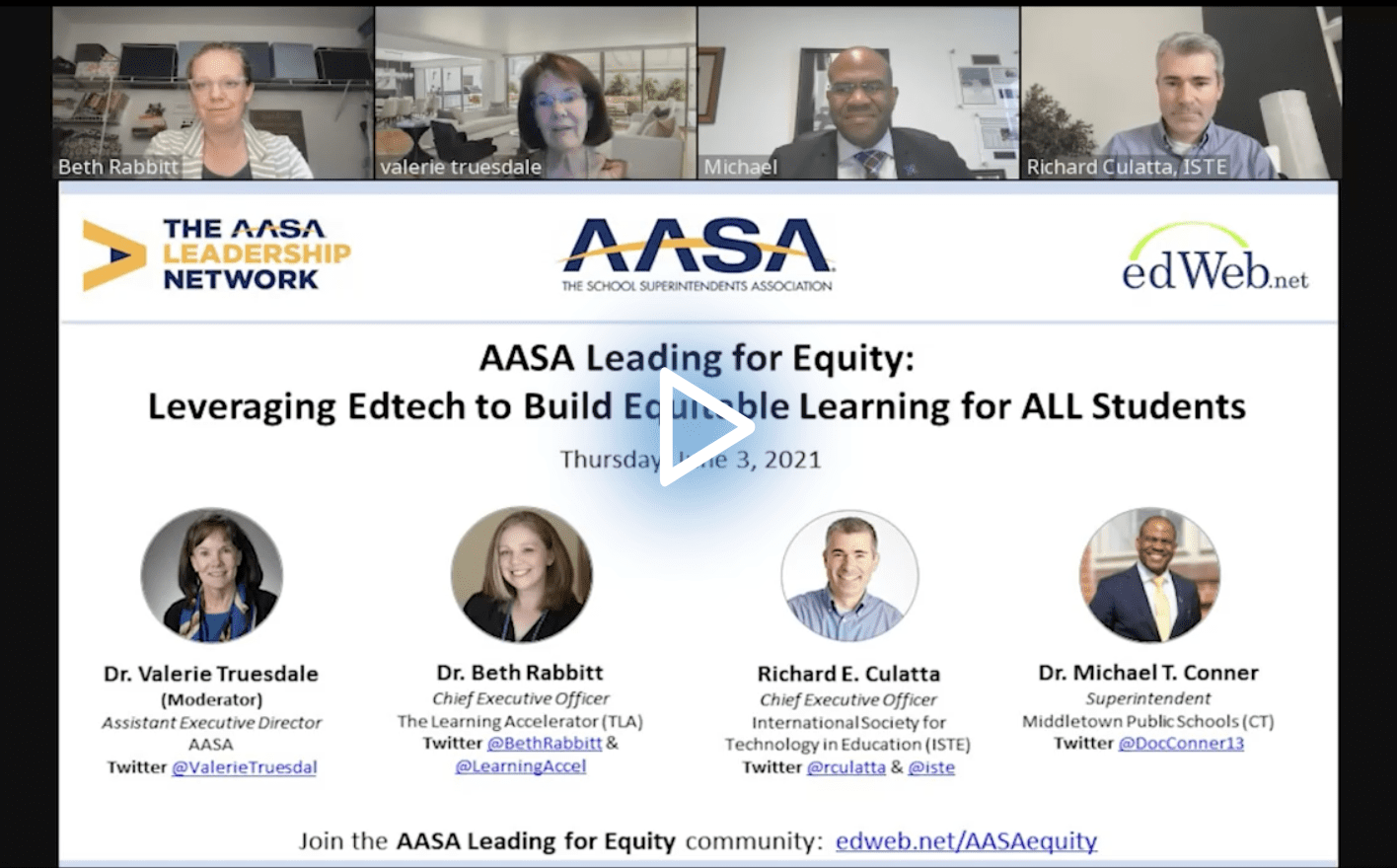Technology and Innovation as Paths to Educational Equity
The COVID-19 pandemic exposed and, in many ways, worsened the digital divide and other inequitable aspects of America’s education system. However, it also created opportunities to develop more equitable outcomes, based on the widespread switch to digital learning experiences and new education models.
Ways to move the transformational process forward and in a positive direction were discussed during a recent edWebinar, hosted by AASA, The School Superintendents Association and AASA’s Leadership Network. The presentation featured Dr. Beth Rabbitt, Chief Executive Officer of The Learning Accelerator; Richard E. Culatta, Chief Executive Officer of International Society for Technology in Education (ISTE); and Dr. Michael T. Conner, Superintendent of Middletown Public Schools (CT).
Learning Transformation
Dr. Rabbitt identified several long-standing challenges that could be met through improved access to digital technologies and more effective use of them. The challenges included stagnant educational models that don’t serve all learners, and unequal access to computer networks and high-quality digital resources. By building on the distribution of devices and adaptation of digital technologies during the pandemic, transformational opportunities now include being able to support all learners effectively through the use of more personalized and holistic learning experiences.
A crucial requirement for this sort of educational transformation is understanding where schools are now, and where they need to go in order to accelerate learning and increase resiliency. Dr. Rabbitt described three phases that most school districts have been through since the pandemic began, as schools first had to stabilize, then recover from the disruptions, and now have an opportunity for advancement.
Key aspects of educational advancement are more effective personalization of teaching and learning and using more targeted, culturally responsive resources and experiences to deeply engage students. Learning should be active, socially connective, growth-oriented, and mastery-based, using resilient, schoolwide systems that accommodate both analog and technology-based approaches.
Dr. Rabbitt cited several examples of actionable strategies and practices that were developed or used during the pandemic, such as performance-based tutoring, virtual intervention sessions, and drama classes that combined online instruction, viewing of Broadway shows, and remote student performances. The types of experiences, and the switch to web-based or hybrid learning models overall, helped many students develop an increased readiness and ability to proceed with self-directed learning and practice.
Dr. Rabbitt also noted ways in which many educators’ development has been transformed during the pandemic, such as the development of new technological skills and the use of online professional learning models. And she pointed out district teams had demonstrated agility and an ability to collaborate that can further accelerate the educational transformations that are still needed.
Disruptive Innovation
Culatta explained times of crisis and disruption often, though not always, result in a “bloom of innovation.” He believes the pandemic has created one of those moments, which can lead to an accelerated digital transformation of education that increases access, awareness, engagement, and equity.
Culatta identified two critical understandings needed to ensure all students benefit from the innovation that occurs. The first understanding is that equity is more than connectivity, and students need effective and active digital learning experiences, as well as prepared teachers. The second understanding is students need help becoming successful digital citizens, which means being inclusive, informed, balanced, engaged, and alert while online.
He also pointed out disruption does not cause innovation; it merely creates the conditions in which smart people can innovate. There’s still a possibility that schools and districts will go back to doing what they did pre-pandemic, so educators who want innovation must take advantage of the current moment and the funding that’s available, in order to design much better learning experiences for the future.
Reimagining Education
Dr. Conner sees the post-pandemic period as an opportunity to reimagine education for equity, which will require an agile mindset and a willingness to explore and experiment. He divides the last few years into three eras:
- BC – Before COVID, when there was an industrial model of education that resulted in disparities and inequities.
- DC – During COVID, when educators needed to change and become more inclusive.
- AC – After COVID, when educators can intentionally disrupt the industrial model, as well as leverage innovation with an equity lens in order to overcome the achievement and economic opportunity gaps.
Along with the traditional triangular model of teacher, content, and student, Dr. Conner envisions a new triangular model of technology, data/analytics, and artificial intelligence, with advanced statistical models assessing and monitoring students in order to meet them at the right level with on-demand learning experiences.
His district is implementing a Digital Learning Strategy, which is defined as the practice of achieving learning outcomes through the considered application of technology. Key components include harnessing technology in order to unlock learning potential, changing schools’ culture, and supporting innovation.
In order to implement this type of approach, there’s an emphasis on interdisciplinary work and designing outcomes, with the needs of the economy in mind, in order to avoid opportunity gaps for graduating students. The process Dr. Conner outlined includes developing minimal viable products, prototyping, and the use of divergent teams to solve specific problems, with analytics in the background driving and informing the innovative work that occurs.
In alignment with 21st century careers, students’ learning is being personalized as part of a growth model driven by data, which includes analysis of the efficacy of instruction. And as students progress, their learning can occur within occupational clusters and include the use of virtual technology to provide even more dynamic learning experiences that will help to prepare them for the future.
This edWeb broadcast was hosted by AASA, The School Superintendents Association and AASA’s Leadership Network, providing premier professional learning for educational leaders.
Watch the Recording Listen to the Podcast
About the Presenters
Dr. Beth Rabbitt is Chief Executive Officer of The Learning Accelerator (TLA). She is a nationally recognized expert in education innovation and blended and personalized learning. Prior to becoming CEO in 2016, Dr. Rabbitt was a partner on TLA’s start-up team, leading the organization’s work to develop educator training systems and researching emerging teaching and learning models and practices.
Before joining TLA, Dr. Rabbitt was a doctoral resident and Director of Human Capital and Innovation at a school in Newark, NJ, where she developed and completed research on competency-based approaches to teacher professional learning. Prior to that, she was an associate partner at the NewSchools Venture Fund, a consultant to and with Education Resource Strategies, and the founding doctoral fellow at the Harvard Innovation Lab. She began her early career in education as a teaching intern in the Marshall Islands, which led her to pursue an undergraduate research fellowship in educational neuroscience and to become the director of environmental education for an urban youth program in Massachusetts.
Dr. Rabbitt serves on the board of several education nonprofits, including the Highlander Institute, Catalyst:Ed, and InnovateEDU. She earned a B.A. from Dartmouth College and a Doctor of Education Leadership (Ed.L.D.) from Harvard University.
Richard Culatta is an internationally recognized education innovator with vast experience in education policy, teacher preparation, and educational technology.
Prior to joining ISTE, he served as the chief innovation officer for the state of Rhode Island where he led the state to become the first to offer computer science in every K-12 school. As the director of the U.S. Department of Education’s Office of Educational Technology, Richard was at the helm of numerous efforts to expand connectivity to schools across the country, promote personalized learning and develop the National Education Technology Plan.
Richard is the author of the new book Digital for Good: Raising Kids to Thrive in an Online World focusing on helping schools and families create effective digital citizens. Richard began his career in the classroom as a high school teacher and, across his career, has coached educators and national leaders around the world on using technology as a tool to reimagine learning.
Michael T. Conner, Ed.D. is the superintendent for Middletown Public Schools in Middletown, CT. Previously, he served as Chief Academic Officer (Norwalk, CT), Assistant Superintendent of Teaching and Learning (Willimantic, CT) and Principal of Augusta Lewis Troup School (New Haven, CT). Dr. Conner obtained his Bachelor of Arts in elementary education/humanities from Lasell University. He also received his Master of Science degree from the University of Bridgeport, Sixth-Year Diploma from Southern Connecticut State University, and doctorate in education from Cambridge College. Dr. Conner completed the prestigious Executive Leadership Program at the University of Connecticut and attended the Harvard Superintendents Institute. He also completed the prestigious AASA National Urban Superintendents Academy (cohort III) in Washington, D.C. Dr. Conner obtained his graduate diploma in business analytics from Harvard University and is currently completing an advanced certificate (ACE) in management, innovation, and technology at MIT.
For his overall efforts, Dr. Conner was recognized by The Network Journal as a “Top 40 Under 40” recipient. He was also recognized by the Connecticut NAACP (100 Most Influential Blacks in Connecticut), Middlesex NAACP (Education Award), Eleven28 Entertainment (100 Men of Color Award), Cross Street African Methodist Episcopal Zion Church (Rev. George E. Battle Senior Education Award), Middlesex United Way (Community Leadership Award), and DECA Inc. (National Administrator of the Year). Under his leadership, Middletown Public Schools was recognized as a 2019 AASA/SPN National Innovation and Transformational District, of which only 17 districts nationally received this distinction. Also, Middletown Public Schools received the honor as a 2020 National Innovative District by the International Center for Leadership in Education. Dr. Conner was featured in AASA’s School Administrator magazine for his article entitled What Mentoring Means to a New Superintendent of Color. This past August, Middletown Public Schools was featured in Time Magazine and AASA’s School Administrator magazine with Ray McNulty highlighting their innovative blended learning model that underpins the latest research around personalized learning using artificial intelligence. Most recently, Dr. Conner was selected by The School Superintendents Association (AASA) and Successful Practices Network (SPN) to serve on the Learning 2025: National Commission on Student-Centered, Equity-Focused Education as a commissioner. He will be making recommendations on innovative and equity-based practices for agencies and districts throughout the country to adopt holistically.
About the Moderator
Dr. Valerie Truesdale joined AASA early in 2019 as the assistant executive director responsible for guiding leadership development services and programs. With years of experience in the superintendency and roles in instructional technology, she knows that AASA’s Leadership Network can be a substantial resource for school leaders trying to keep pace with the rapidly changing delivery of K-12 education.
Join the Community
Leading for Equity is a free professional learning community on edWeb.net for school and district leaders who face many challenges leading schools and driving school improvement for all students, especially now with COVID-19.
The AASA Leadership Network drives superintendent success, innovation, and growth, shaping the future of public education while preparing students for what’s next. We are the largest, most diverse network of superintendents in America. Passionate and committed, we connect educational leaders to the professional learning, leadership development, relationships, and partnerships they need to ensure a long career of impact.
The summary of this presentation was written by Robert Low.
Robert Low has more than 30 years of educational publishing experience, ranging from editing and product management to online advertising and content development. He also works with edWeb.net to write articles on their professional learning edWebinars.






Comments are closed.